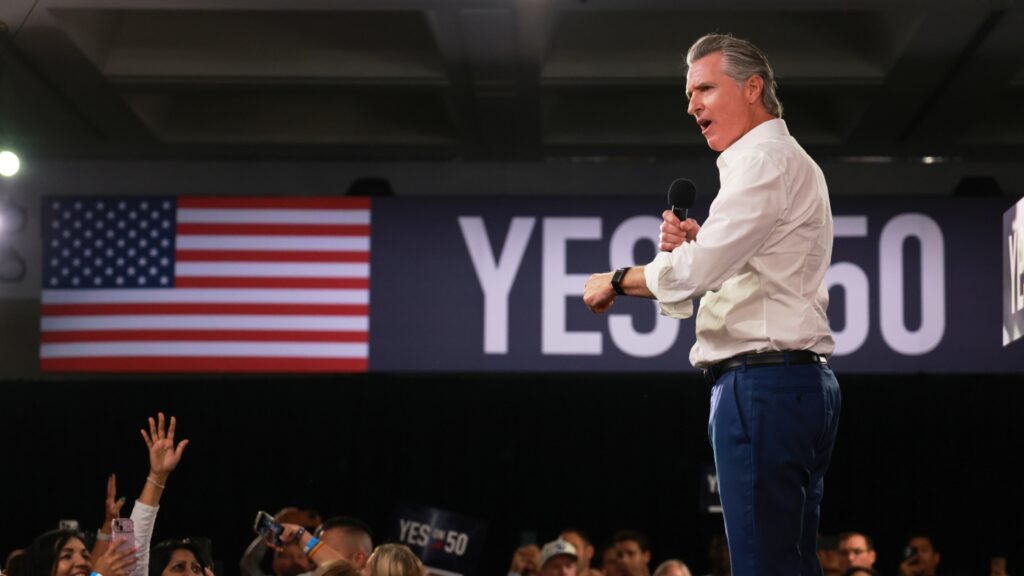Gov. Gavin Newsom speaks during a campaign event for Proposition 50 on Saturday in Los Angeles. Newsom has been the driving force behind the ballot measure, as a way for California Democrats to fight back in the redistricting battle initiated by President Trump.
Ethan Swope/AP
hide caption
toggle caption
Ethan Swope/AP
SAN FRANCISCO — California voters have easily approved a ballot measure to redraw the state’s congressional map to favor Democrats, according to a race call by The Associated Press, marking the party’s biggest victory to date in a national battle over redistricting ahead of the 2026 midterms.
The measure, called Proposition 50, will replace lines drawn by an independent commission with a map that could net Democrats as many as five new seats in next year’s U.S. House elections.
The AP called the race just as polls closed in California. The result caps a strong election night for Democrats, who also pocketed notable wins in Virginia and New Jersey.
In an abbreviated campaign that saturated California’s airwaves with ads, Gov. Gavin Newsom convinced voters that the state needed to draw new maps to counteract gerrymandering done at President Trump’s behest in Republican-led states such as Texas.
In Texas, Missouri and North Carolina, the new GOP-friendly maps were enacted after approval by the state legislature.
But in California, Newsom and Democratic allies needed to win approval from voters for the new political lines, because voters had given congressional line-drawing power to an independent citizens commission in 2010.
The commission remains popular in California, but Newsom was able to amplify the partisan stakes of the campaign, arguing that California could not stand by and watch Republicans bake in a sizable advantage through redistricting ahead of midterm elections that will decide control of power in a closely divided House of Representatives.
The results, said California political strategist Erica Kwiatkowski Nielsen, “shows a huge appetite and just the willingness of Californians to stand up to Donald Trump.”
“I think the campaign did a fantastic job of saying and acknowledging people’s fears that, hey, we’ve been a leader in California on redistricting but this isn’t politics as usual,” Nielsen said. “These are unprecedented times.”
Newsom’s “Yes” side wins the money battle
Newsom, who has positioned himself as a primary foil to Trump, amassed a war chest to support the measure — bringing in nearly $120 million as of Friday. Top donors included House Majority PAC, a group working to elect Democrats to the House, and George Soros’ Fund for Policy Reform.
The Yes campaign blanketed the state with ads featuring top Democrats, from former President Barack Obama to New York Rep. Alexandria Ocasio-Cortez.
Polling in the last week of the campaign showed more than 90% of Democrats supporting the measure and more than 90% of Republicans opposed.
That didn’t bode well for opponents of Proposition 50, given Democrats’ strong registration advantage in the state.

The campaign against Proposition 50 was led by Charles Munger Jr., a Bay Area donor who bankrolled the original campaign to create the citizens redistricting commission in 2008. Munger contributed nearly $33 million to the No on 50 campaign — but his donations accounted for roughly three-quarters of the $44 million raised by opponents.
Other Republican heavyweights stayed away from the campaign and spending against Proposition 50 dried up in the final weeks of the race, as polling showed the measure opening up a wide lead.
Even Arnold Schwarzenegger, the former California Republican governor who worked with Munger to create the citizens commission, played a restrained role in the campaign — voicing his opposition to Proposition 50 in just a handful of interviews and public appearances.
The changes to the state’s congressional map are sure to trigger a series of difficult decisions for Republican incumbents in the coming weeks.
U.S. Reps. Ken Calvert, Darrell Issa, Kevin Kiley and Doug LaMalfa will have to weigh running in districts where chances of reelection range from challenging to virtually impossible.
The new lines approved under Proposition 50 will remain in place through the 2030 election, after which the citizens commission would again take over redistricting responsibilities.

